Pacific cod
The Pacific cod, Gadus macrocephalus, is a species of ray-finned fish in the family Gadidae. It is a bottom-dwelling fish found in the northern Pacific Ocean, mainly on the continental shelf and upper slopes, to depths of about 900 m (3,000 ft). It can grow to a length of a meter or so and is found in large schools. It is an important commercial food species and is also known as gray cod or grey cod, and grayfish or greyfish. Fishing for this species is regulated with quotas being allotted for hook and line fishing, pots, and bottom trawls.
| Pacific cod | |
|---|---|
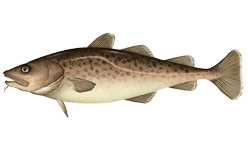 | |
| Scientific classification | |
| Kingdom: | Animalia |
| Phylum: | Chordata |
| Class: | Actinopterygii |
| Order: | Gadiformes |
| Family: | Gadidae |
| Genus: | Gadus |
| Species: | G. macrocephalus |
| Binomial name | |
| Gadus macrocephalus Tilesius, 1810 | |
| Synonyms[1] | |
| |
Description
It has three separate dorsal fins, and the catfish-like whiskers on its lower jaw. In appearance, it is similar to the Atlantic cod. A bottom dweller, it is found mainly along the continental shelf and upper slopes with a range around the rim of the North Pacific Ocean, from the Yellow Sea to the Bering Strait, along the Aleutian Islands, and south to about Los Angeles, down to the depths of 900 meters (~ 3000 feet). May grow up to 1 m (39") and weigh up to 15 kg (33 lbs). It is found in huge schools.[2]
Molecular genetic analyses strongly suggest that Pacific cod and Greenland cod (Gadus ogac) from Greenland–the Arctic Ocean are the same species; G. ogac is then a junior synonym of G. macrocephalus.[3] Nevertheless, ITIS still lists Gadus ogac as a valid name.[4] This change would greatly expand the geographic range of Pacific cod.
Fisheries
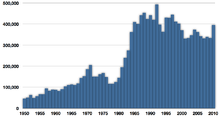
In the Northeast Pacific catches of Pacific cod by the United States trawl fishery and joint-venture fisheries increased from less than 1,000 tonnes in 1979 to nearly 91,000 tonnes in 1984 and reached 430,196 tonnes in 1995. Today, catches are tightly regulated and the Pacific cod quota is split among fisheries that use hook and line gear, pots, and bottom trawls.
Conservation status
The Salish Sea population of Pacific cod is a U.S. National Marine Fisheries Service Species of Concern, one of those species about which the U.S. Government's National Oceanic and Atmospheric Administration has some concerns regarding status and threats, but for which insufficient information is available to indicate a need to list the species under the U.S. Endangered Species Act (ESA).[5]
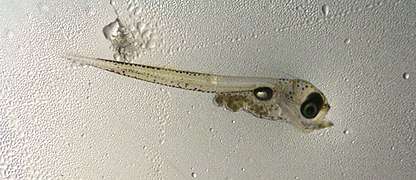 Pacific cod larva
Pacific cod larva Young Pacific cod
Young Pacific cod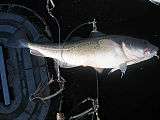 Adult Pacific cod caught on jigging gear
Adult Pacific cod caught on jigging gear
See also
Notes
- Froese, Rainer and Pauly, Daniel, eds. (2018). "Gadus macrocephalus" in FishBase. February 2018 version.
- Gadus macrocephalus (Tilesius, 1810) FAO, Species Fact Sheet. Retrieved April 2012.
- Carr, S. M.; Kivlichan, D. S.; Pepin, P.; Crutcher, D. C. (1999). "Molecular systematics of gadid fishes: Implications for the biogeographic origins of Pacific species". Canadian Journal of Zoology. 77: 19–26. doi:10.1139/z98-194.
- "Gadus ogac". Integrated Taxonomic Information System. Retrieved 24 September 2012.
- Species of Concern NOAA
References
- "Gadus macrocephalus". Integrated Taxonomic Information System. Retrieved 19 March 2006.
- Froese, Rainer and Pauly, Daniel, eds. (2005). "Gadus macrocephalus" in FishBase. November 2005 version.
External links
- Pacific cod-Gadus macrocephalus fishery profiles Status of Pacific cod fisheries, summarised in FisheriesWiki
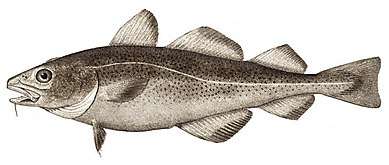
.png)
